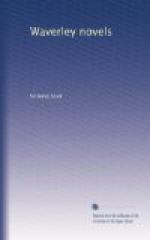In the year 1807-08 I undertook, at the request of John Murray, Esq., of Albemarle Street, to arrange for publication some posthumous productions of the late Mr. Joseph Strutt, distinguished as an artist and an antiquary, amongst which was an unfinished romance, entitled Queenhoo Hall. The scene of the tale was laid in the reign of Henry VI, and the work was written to illustrate the manners, customs, and language of the people of England during that period. The extensive acquaintance which Mr. Strutt had acquired with such subjects in compiling his laborious Horda Angel-Cynnan, his Regal and Ecclesiastical Antiquities, and his Essay on the Sports and Pastimes of the People of England had rendered him familiar with all the antiquarian lore necessary for the purpose of composing the projected romance; and although the manuscript bore the marks of hurry and incoherence natural to the first rough draught of the author, it evinced (in my opinion) considerable powers of imagination.
As the work was unfinished, I deemed it my duty, as editor, to supply such a hasty and inartificial conclusion as could be shaped out from the story, of which Mr. Strutt had laid the foundation. This concluding chapter [Footnote: See Appendix No. II.] is also added to the present Introduction, for the reason already mentioned regarding the preceding fragment. It was a step in my advance towards romantic composition; and to preserve the traces of these is in a great measure the object of this Essay.
Queenhoo Hall was not, however, very successful. I thought I was aware of the reason, and supposed that, by rendering his language too ancient, and displaying his antiquarian knowledge too liberally, the ingenious author had raised up an obstacle to his own success. Every work designed for mere amusement must be expressed in language easily comprehended; and when, as is sometimes the case in Queenhoo hall, the author addresses himself exclusively to the antiquary, he must be content to be dismissed by the general reader with the criticism of Mungo, in the Padlock, on the Mauritanian music, ’What signifies me hear, if me no understand?’
I conceived it possible to avoid this error; and, by rendering a similar work more light and obvious to general comprehension, to escape the rock on which my predecessor was shipwrecked.
But I was, on the other hand, so far discouraged by the indifferent reception of Mr. Strutt’s romance as to become satisfied that the manners of the middle ages did not possess the interest which I had conceived; and was led to form the opinion that a romance founded on a Highland story and more modern events would have a better chance of popularity than a tale of chivalry.
My thoughts, therefore, returned more than once to the tale which I had actually commenced, and accident at length threw the lost sheets in my way.
I happened to want some fishing-tackle for the use of a guest, when it occurred to me to search the old writing-desk already mentioned, in which I used to keep articles of that nature.




